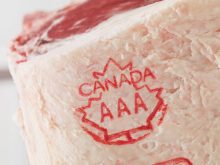Washington, D.C. — Agricultural trade between Canada and the United States is important and valuable to both countries, officials told journalists from both countries April 25.
“We literally grow things together to feed communities at home and around the world,” Canada’s deputy ambassador, Arun Alexander, told members of North American Agricultural Journalists during their visit to the Canadian embassy.
“Canada is the second largest agricultural customer [after China] of the United States. The United States exports more agricultural and agri-food products to Canada than to Japan, Korea and Taiwan combined.
Read Also

Trade uncertainty is back on the Canadian national menu
Even if CUSMA-compliant goods remain exempt from Trump’s new tariffs for now, trade risk for farmers has not disappeared, Sylvain Charlebois warns.
“In 2022, bilateral trade in agriculture between Canada and the United States reached almost $70 billion. Our bilateral trade in agriculture has increased nearly five-fold since NAFTA and continues to grow through the USMCA [United States Mexico Canada Agreement],” said Alexander.
Posters around the meeting room sought to drive home that message. The displays featured annotated photographs of meals that noted the origin of ingredients. The pork ribs came from hogs born in Manitoba, raised in Iowa and processed in Illinois. The coleslaw was made with cabbage from Quebec and carrots from California.
Through the USMCA, Canada and the U.S. do about $2 billion in agricultural trade each day.
“The USMCA is reinforcing the strong trilateral economic relationship and the continued integration of the North American agriculture and agri-food production platform,” Alexander said.
“The agreement also provides predictability and stability for businesses and workers in all three countries. So much of our shared success on both sides of the border is as a result of our integrated supply chains supported by the USMCA.”
For example, Canadian oats are used in breakfast cereals and snack bars produced in the United States, he said. Strawberry plants from Canada are shipped to the U.S. to be grown, while the strawberries they produce are shipped to Canada in winter.
Canadian livestock are fed in American feedlots. The finished products are enjoyed on both sides of the border and around the world, Alexander said.
“We co-operate on shared challenges in the agri-food industry, such as food inflation, labour shortages and preventing and mitigating risks of plant pests and animal diseases. The U.S. and Canada promote sustainable agricultural practices that help preserve and restore our shared natural environment.”
There are trade irritants too.
“While we remain disappointed that the United States has again initiated a dispute settlement process under the USMCA on dairy, we take our obligations under international trade agreements very, very seriously— including those with the U.S., our closest trading partner,” Alexander said.
“Given the ongoing panel process, I am unable to speak to specifics. However, we are, as always, engaging in good faith and remain committed to the dispute settlement process and to the agreement.”
In 2021, the U.S. argued that allocations of tariff rate quotas, which allow limited access to Canada’s supply-managed dairy market, shut out American firms. A USMCA panel agreed. Canada later shifted its tariff rate quota policy to be more open, but in January the U.S. again asked for a USMCA dispute panel, saying the issues had not been addressed.
On April 24, John Boozman, ranking member of the Senate agriculture committee, told ag journalists that trade irritants are part of doing business.
“We need to be able to talk to each other, especially Canada and Mexico,” Boozman said. “We’re so blessed to have countries, again, that have common values and things like that. It’s like families that have squabbles.
“I think the process is the main thing. We make sure that that functions so we can work these things out, because invariably, there is so much trade going back and forth that you’re going to have those difficulties. As a rule, we need to do a better job of holding our trading partners’ feet to the fire.”
















